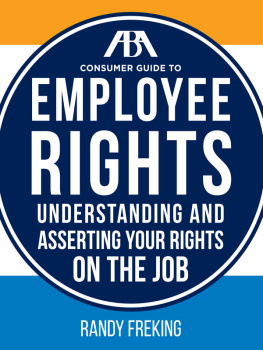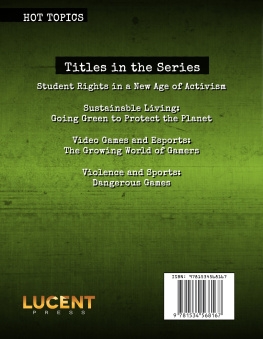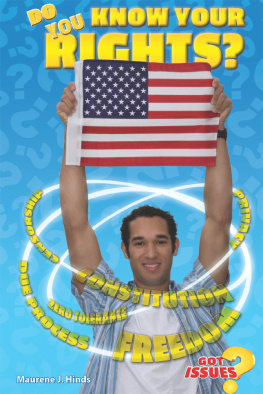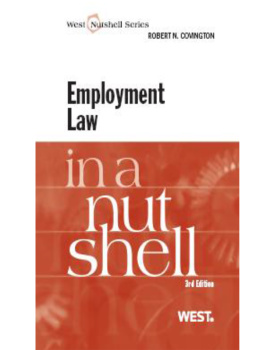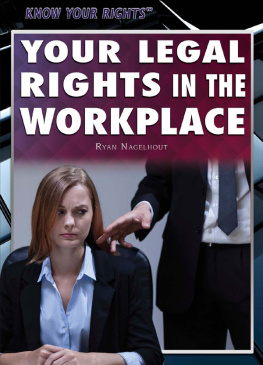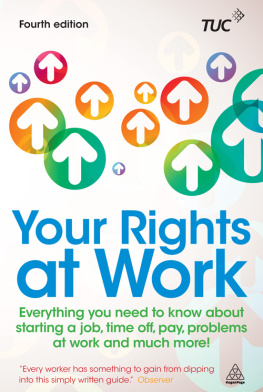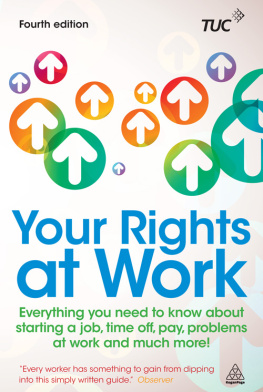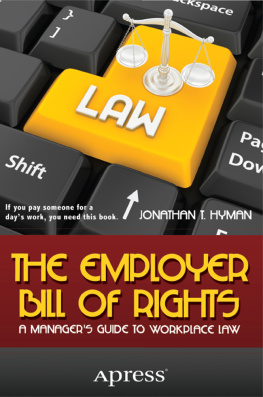
CONSUMER GUIDE TO EMPLOYEE RIGHTS
UNDERSTANDING AND ASSERTING YOUR RIGHTS ON THE JOB
RANDY FREKING
Cover and interior design by Anthony Nuccio/Ankerwycke.
In 1215, the Magna Carta was sealed underneath the ancient Ankerwycke Yew tree, starting the process that led to rule by constitutional lawin effect, giving rights and the law to the people. Today, the ABAs Ankerwycke line of books continues to bring the law to the people. With legal fiction, true crime books, popular legal histories, public policy handbooks, and prescriptive guides to current legal and business issues, Ankerwycke is a contemporary and innovative line of books for everyone from a trusted and vested authority.
2015 American Bar Association. All rights reserved.
No part of this publication may be reproduced, stored in a retrieval system, or transmitted in any form or by any means, electronic, mechanical, photocopying, recording, or otherwise, without the prior written permission of the publisher. For permission contact the ABA Copyrights & Contracts Department, .
e-ISBN: 978-1-63425-022-1
Library of Congress Cataloging-in-Publication Data
Freking, Randy, author.
The ABA consumer guide to employee rights: understanding and asserting your rights on the job/Randy Freking.
pages cm
Includes bibliographical references and index.
1. Labor laws and legislationUnited StatesPopular works. 2. Employee rightsUnited StatesPopular works. I. Title. II. Title: American Bar Association consumer guide to employee rights.
KF3455.F744 2015
344.730101dc23
2015021652
Discounts are available for books ordered in bulk. Special consideration is given to state bars, CLE programs, and other bar-related organizations. Inquire at Book Publishing, ABA Publishing, American Bar Association, 321 N. Clark Street, Chicago, Illinois 60654-7598.
www.ShopABA.org
I dedicate this book to every employee in the United States who tries to balance the all-encompassing demands of his or her family, his or her employer, and his or her job.
Acknowledgments
I would like to acknowledge the individuals who assisted me in the creation of this book:
Most importantly, Susan Bradley of Eagan, Minnesota, spent countless hours editing my book and asking substantive questions that improved the quality of the information presented. In addition, Bill Thompson of Cincinnati provided valuable editing assistance from his many years as a copy editor for the Cincinnati Enquirer . Paul H. Tobias, the founder of the National Employment Lawyers Association and co-founder of the National Employee Rights Institute (now called Workplace Fairness), has been my mentor since 1990, when I began my private practice representing employees. Paul graciously reviewed the text and provided valuable insight to me as he has done the last 25 years.
Kelly Mulloy Myers, one of my six law partners, devoted her attention to the substance of the information contained in this book and provided valuable assistance.
Karen Pavy and Andrea Dautel, our administrative assistants, patiently assisted with the seemingly never-ending modifications to the text and formatting of the book.
Stuart Kunkler of Cincinnati, Ohio, for his input and assistance.
Last but not least, all of my partners, colleagues, members of the National Employment Lawyers Association and Workplace Fairness, and our clients who have provided much of the practical, day-to-day advice that is important whenever considering various workplace issues.
Contents
Introduction
If you work for a living, regardless of whether you are a blue collar hourly employee or a white collar salaried worker, this book is for you. It contains important information that your prospective, current, or former employer does not want you to know, including the basics of your rights and obligations in the workplace, as well as practical tips on how to level the playing field regarding issues that arise every day on the job.
Your job is likely one of the three most important aspects of your life, along with your family and your religion, in whatever order of priority you choose. Despite the central importance of ones job, most people dont fully understand the rules that define their employment or know what to do when the relationship with their employer sours.
All too often, employees who have questions about their rights at work rely on their not-so-well-intentioned bosses, or on well-meaning but misinformed coworkers, friends, and family members. For a variety of reasons, not the least of which is the complexity of employment law, the information provided by these people cannot often be trusted. In addition, when employees search various HR websites for answers to their employment questions, they usually become more confused than they were to begin with. The difficulty in obtaining clear, reliable information leaves employees with many questions, such as the following:
- Do I have any rights in the workplace even if I am told I am employed at will?
- What should I do when I receive a warning or a poor performance evaluation that I believe to be unfair?
- Can my boss fire me without any warning?
- Can an employer require me to disclose my social media passwords?
- Am I entitled to overtime pay even if I am paid a salary?
- If I quit or am fired due to no fault of my own, can my current employer enforce the noncompetition agreement I signed when I was hired?
- What forms of discrimination are unlawful?
- What are my rights if I think I am the victim of discrimination?
- What are my rights if I am working in a hostile work environment?
- Am I protected if I complain about unfair treatment?
- When should I seek legal help for problems on the job?
You will find answers to these and many other common questions in this easy-to-read book, along with practical tips to help you protect your job and enforce your rights.
It bears mentioning at the outset that your chances of continuing to draw a paycheck are much higher if you know your rights and employ successful strategies to keep your job, since the odds for a favorable outcome are not in your favor if you entrust your case to the justice system. Seeking legal remedy after a job loss is less than ideal because of the many twists and turns that can ensue, as well as the very real possibility that a decision will not go in your favor. Even if you have been undeniably wronged in your employment, your outcome will be significantly affected by factors such as whom you or the company retains as counsel, your ability to afford a legal battle, the attitude of the company toward a peaceful settlement, characteristics of the court system and judges in your jurisdiction, and ultimately your luck of the draw with potential jurors. Given these many variables, it is wiser for you to know your rights now rather than plan on winning a legal challenge down the long road of litigation.
We recommend that you read each of the chapters of this book to fully understand the employment relationship, but if you seek information on a specific issue, the chapters are organized so you can find what you need in a matter of minutes.
This book is focused on the rights of employees in the private sector, rather than the public sector. Public employees should be aware that, generally, they have greater employment and job security rights than employees in the private sector. Such employees should make sure they are knowledgeable about their rights.
To the extent that public employees have greater job security than private employees, many state laws require employees to exercise such rights within a very short period of time. Consequently, if you are a public employee, you should know your rights prior to an adverse action by your employer so that you will be able to take timely steps to protect your interests.

